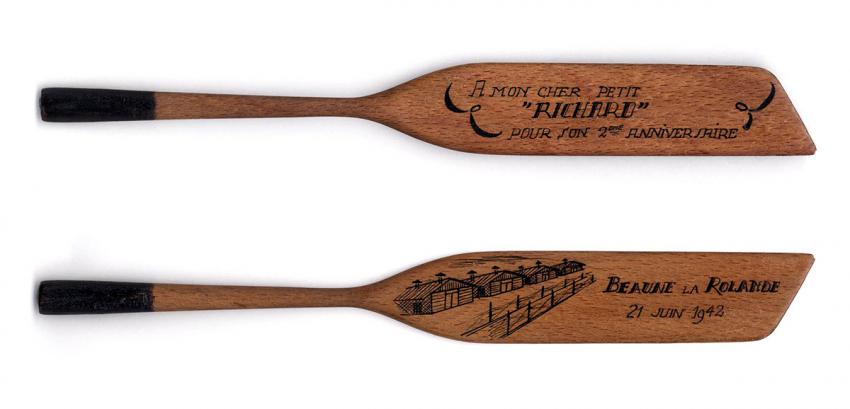In May 1941, over 5,000 Jews were arrested in Paris, most of them of Polish extraction. The detainees were sent to the detention camps of Pithiviers and Beaune-la-Rolande. Nissan Frenkel, an immigrant from Poland, was one of those sent to Beaune-la-Rolande.
In June 1942, Nissan sent his two-year-old son Richard a present: a carved wooden letter-opener.
Approximately one month later, in July 1942, thousands of French gendarmes arrested over 11,000 foreign Jews at the behest of the German authorities. Esther Frenkel, Nissan's wife, was a Polish immigrant, and was therefore arrested in Paris together with her son Richard. They were incarcerated in the Winter Stadium, the Velodrome d'Hiver, better known as the Vel' d'Hiv. The Jews were held there in extremely crowded conditions, almost without food, water or sanitation facilities.
A week later, Esther and Richard were transferred from the Vel d'Hiv to the Pithiviers concentration camp south of Paris. Esther was deported to Auschwitz and murdered, and Richard was left alone in Pithiviers. In late August-early September, he was deported on his own, in a sealed cattle-car filled with strangers, to Auschwitz, where he was murdered.
In the two months after the Vel D'Hiv roundup, approximately 1000 Jews were deported to Auschwitz every two-three days. By late September 1942, almost 38,000 Jews had been deported. Some 780 survived the Holocaust.
In total, some 76,000 French Jews, most of them from Paris, were deported to the East, including about 11,000 children. Most were murdered at Auschwitz. Only approximately 2,500 survived.
The Vel d'Hiv roundup, organized by the French authorities and carried out by French gendarmes, has been seared in the French collective memory as a symbol of French responsibility for the fate of the Jews of France during the Holocaust.
A few days after Nissan sent the present to his son, he was also sent to Auschwitz, where he too was murdered.
Yad Vashem Artifacts Collection
Donated by Nelly Weinstock, Jerusalem, Israel







